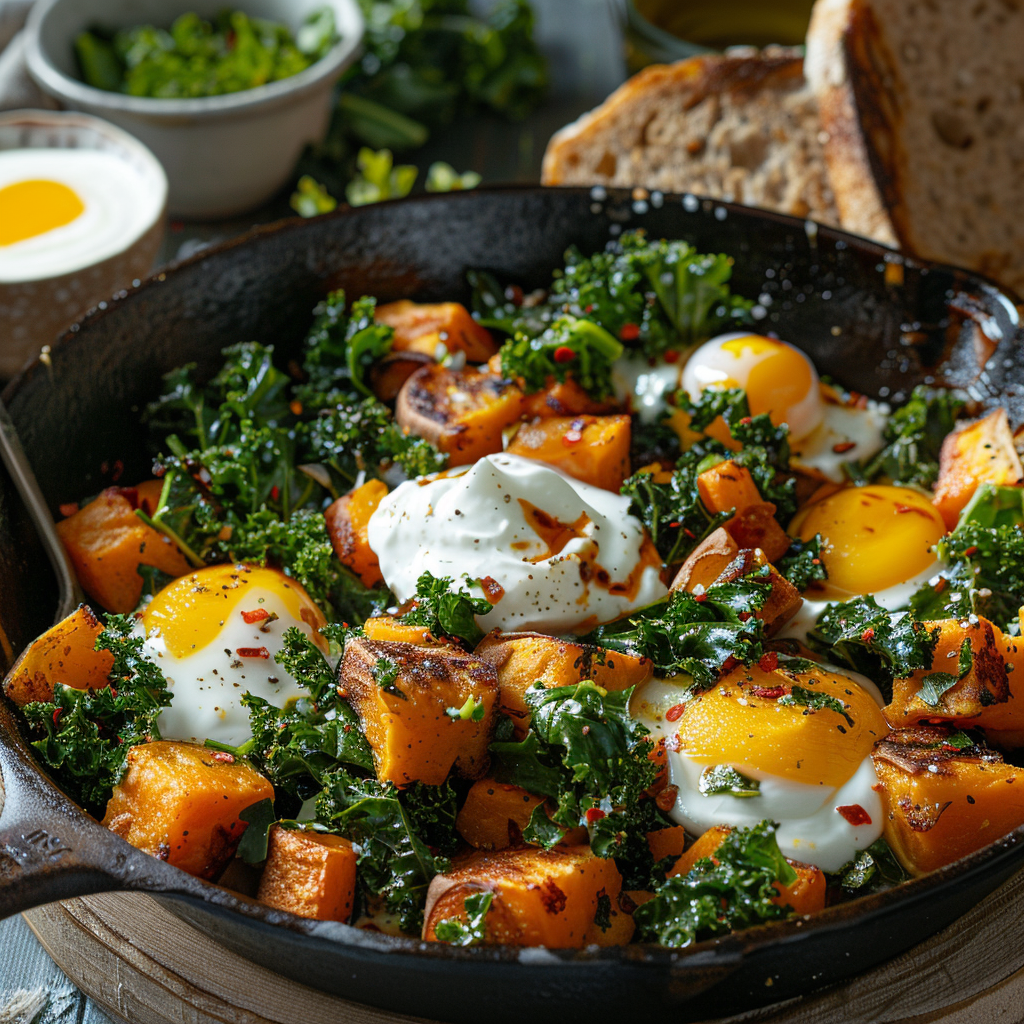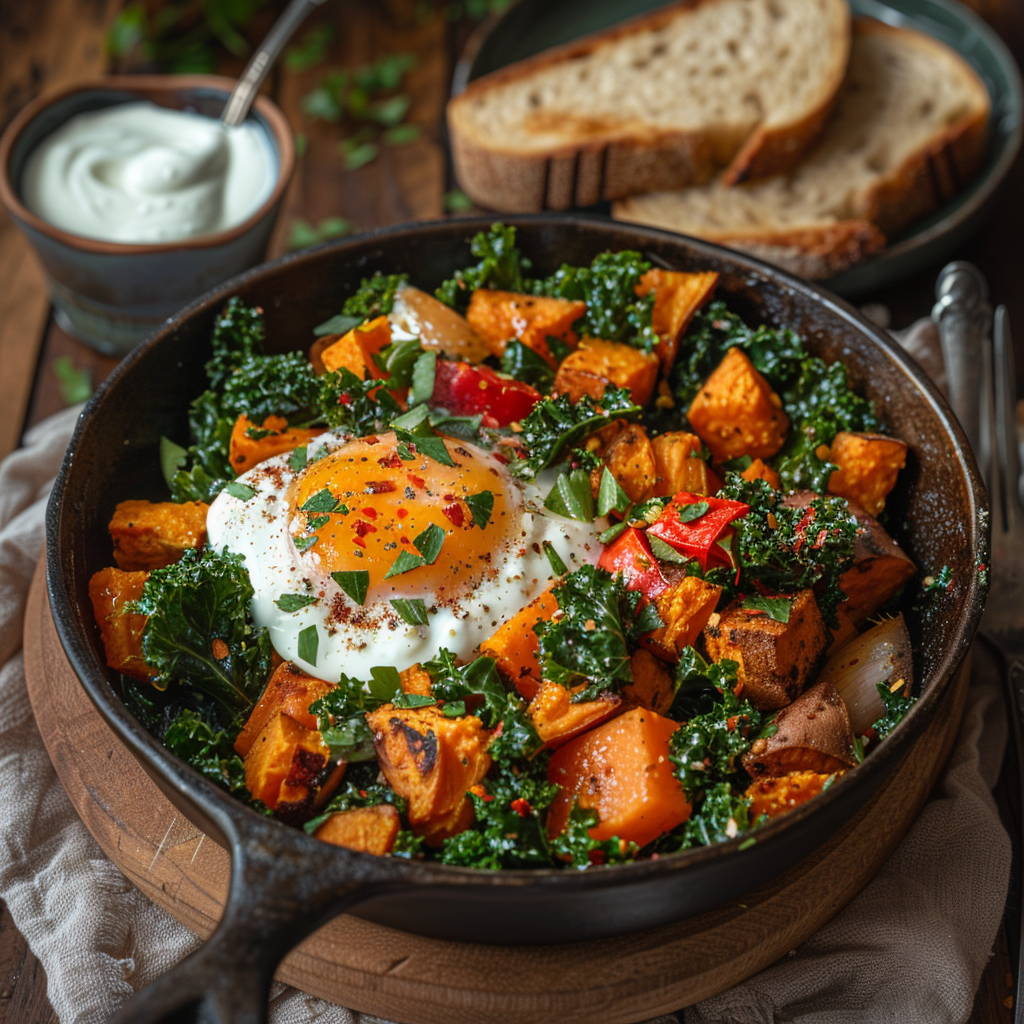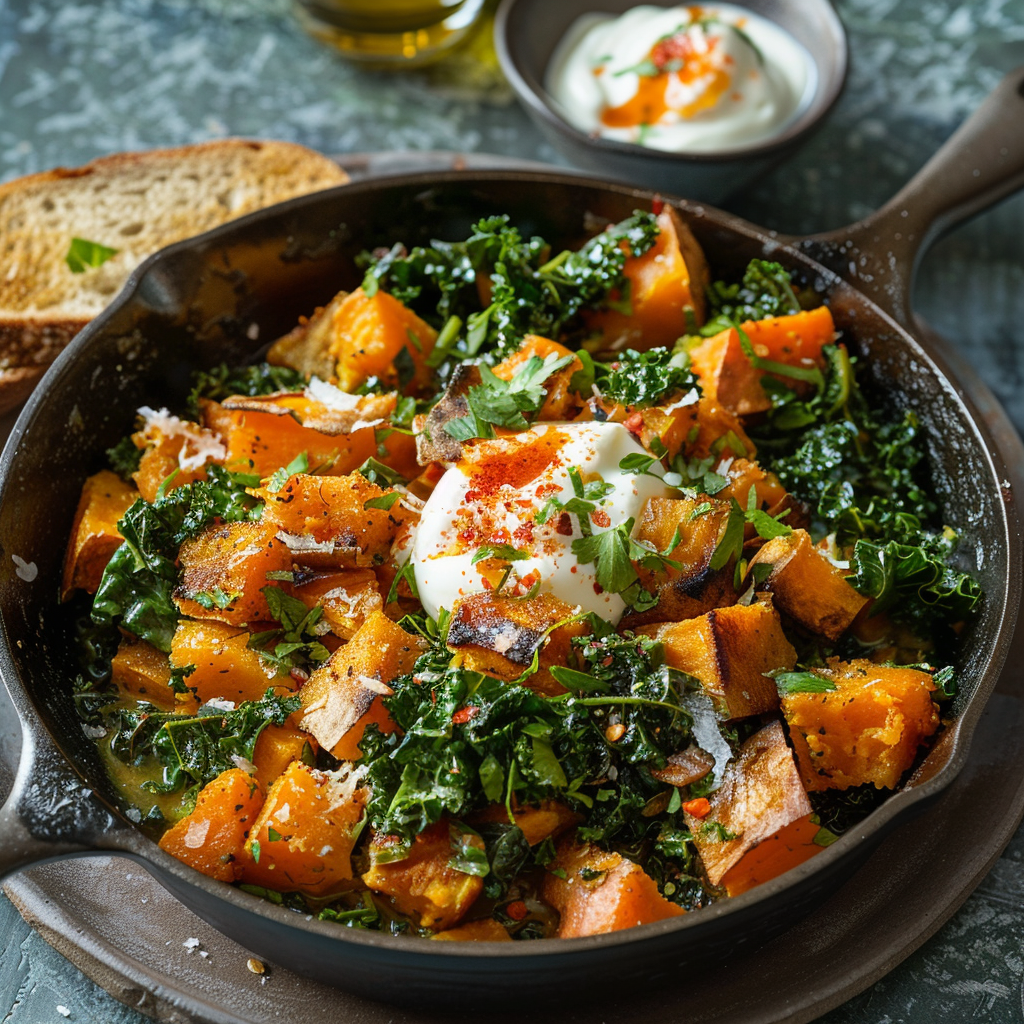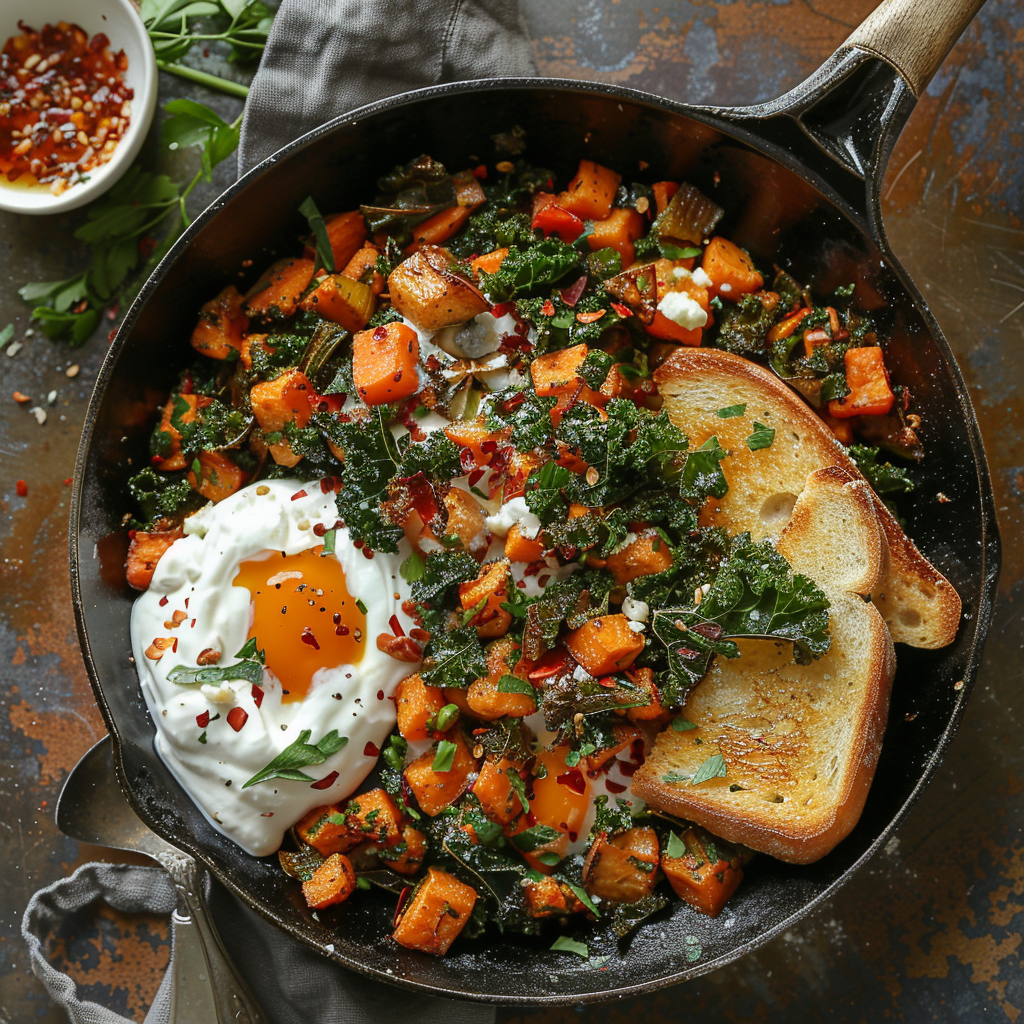
Why This Low Histamine Sweet Potato and Kale Hash Is a Must-Try
Picture this: it’s a chilly Sunday morning, and I’m craving something hearty yet gentle on my body. That’s when I stumbled upon the idea of making a Low Histamine Sweet Potato and Kale Hash. I’ve always loved sweet potatoes for their creamy texture and kale for its earthy flavor, but combining them into a low-histamine dish? Game-changing. What started as an experiment turned into a family favorite. My kids even asked for seconds, which is a win in any mom’s book!
A Little Background on This Dish
Sweet potatoes have been a staple in many cultures for centuries. From Southern soul food to Asian stir-fries, they’re versatile and nutritious. Kale, on the other hand, has earned its superfood status in recent years. Together, they create a comforting hash that’s perfect for those following a low-histamine diet. I first made this recipe during a week when I was trying to cut back on foods that trigger histamine reactions. It was so good that now it’s a regular on our menu.
Why You’ll Love This Recipe
This Low Histamine Sweet Potato and Kale Hash is simple, flavorful, and packed with nutrients. The sweetness of the potatoes balances the slight bitterness of the kale, while spices like paprika and garlic powder add depth. Plus, it’s quick to make—perfect for busy mornings or cozy dinners. And let’s not forget how satisfying it feels to eat something that’s both delicious and good for you.
Perfect Occasions to Prepare This Recipe
This dish shines during weekend brunches, post-workout meals, or even as a side at Thanksgiving. It’s also great for meal prep since it reheats beautifully. I once served it at a potluck, and everyone raved about how unique and tasty it was. Whether you’re cooking for yourself or a crowd, this hash fits the bill.
Ingredients
- 2 medium sweet potatoes, peeled and diced
- 1 bunch of kale, stems removed and chopped
- 1 tablespoon olive oil
- 1 teaspoon smoked paprika
- 1/2 teaspoon garlic powder
- Salt and pepper to taste
- Optional: 1 avocado, sliced for garnish
Substitution Options
- Swap sweet potatoes with butternut squash for a different flavor profile.
- Use spinach instead of kale if you prefer milder greens.
- Coconut oil can replace olive oil for a dairy-free option.
Step 1: Prep Your Ingredients
Start by peeling and dicing your sweet potatoes into bite-sized cubes. Aim for even pieces so they cook uniformly. Next, chop the kale into small strips. As you work, notice how vibrant the colors are—the orange of the sweet potatoes contrasts beautifully with the deep green of the kale. This visual feast is just the beginning!
Step 2: Sauté the Sweet Potatoes
Heat olive oil in a large skillet over medium heat. Add the diced sweet potatoes and sprinkle with smoked paprika, salt, and pepper. Stir occasionally to prevent sticking. Pro tip: Let the potatoes sit undisturbed for a minute or two between stirs to get those golden-brown edges we all love. The aroma of paprika wafting through the kitchen will make your mouth water.
Step 3: Add the Kale
Once the sweet potatoes are tender, toss in the chopped kale. Cook for another 3-4 minutes until the kale wilts but still retains some texture. Be careful not to overcook it—you want that fresh, slightly chewy bite. Watching the kale shrink down and turn bright green is oddly satisfying.
Chef’s Tip
To elevate your Low Histamine Sweet Potato and Kale Hash, top it with a dollop of guacamole or a drizzle of tahini sauce. These additions bring creaminess and richness without triggering histamine reactions.
Timing
Prep Time: 10 minutes
Cooking Time: 20 minutes
Total Time: 30 minutes
Chef’s Secret
For extra flavor, roast the sweet potatoes in the oven before adding them to the skillet. Roasting caramelizes their natural sugars, giving the dish a deeper taste.
Extra Info
Did you know sweet potatoes are loaded with vitamin A? Just one serving provides more than 400% of your daily needs. Pair that with kale’s high fiber content, and you’ve got a powerhouse dish that fuels your body and soul.
Necessary Equipment
- Large skillet
- Sharp knife
- Cutting board
- Spatula
Storage
This Low Histamine Sweet Potato and Kale Hash stores well in the fridge for up to three days. Keep it in an airtight container to maintain freshness. When reheating, sprinkle a little water over the hash to keep it from drying out.
If you need to freeze it, portion it into individual servings. Freeze flat on a baking sheet before transferring to freezer bags. This method saves space and makes defrosting easier.
Reheat gently on the stovetop or microwave. Avoid overheating, as this can make the kale lose its texture.
Tips and Advice
Don’t skip seasoning! Even simple spices like salt, pepper, and paprika can transform the dish. Also, try to use fresh kale for the best results. Frozen kale tends to release too much water, altering the texture of the hash.
Presentation Tips
- Serve in a cast-iron skillet for a rustic look.
- Garnish with fresh herbs like parsley or cilantro.
- Add a squeeze of lime juice for a pop of color and acidity.
Healthier Alternative Recipes
Here are six variations to keep things interesting:
- Spicy Version: Add red pepper flakes for a kick.
- Protein Boost: Stir in boiled chickpeas or lentils.
- Mediterranean Twist: Top with crumbled olives and sun-dried tomatoes.
- Breakfast Style: Serve with a poached egg on top.
- Asian-Inspired: Drizzle with soy sauce and sesame seeds.
- Vegan Delight: Skip animal-based toppings and focus on plant-based fats like avocado.
Mistake 1: Overcrowding the Pan
Overcrowding leads to steaming instead of browning. To avoid this, cook in batches if needed. A crowded pan means soggy sweet potatoes—nobody wants that!
Mistake 2: Skipping Seasonings
Seasoning is key to bringing out the flavors. Don’t be shy with spices. They won’t overpower; they’ll enhance.
Mistake 3: Overcooking the Kale
Kale turns mushy fast. Add it towards the end of cooking and remove it from heat while it’s still vibrant green.
FAQ
What does low histamine mean?
Low histamine refers to foods less likely to trigger allergic reactions or inflammation. This Low Histamine Sweet Potato and Kale Hash avoids high-histamine ingredients like aged cheese or fermented products.
Can I make this recipe vegan?
Absolutely! Simply omit any non-vegan toppings like eggs and stick to plant-based options like avocado.
How do I store leftovers?
Store in an airtight container in the fridge for up to three days. Reheat gently to preserve texture.
Is this recipe gluten-free?
Yes, it’s naturally gluten-free since it uses whole, unprocessed ingredients.
Can I use frozen kale?
You can, but fresh kale yields better texture. If using frozen, thaw and drain excess liquid first.
What sides pair well with this dish?
Grilled chicken, baked salmon, or a simple salad complement this hash beautifully.
How long does it take to prepare?
From start to finish, expect about 30 minutes, including prep and cooking time.
Can I add protein to this recipe?
Definitely! Try adding cooked turkey sausage or tofu for extra protein.
Why is kale considered a superfood?
Kale is rich in vitamins A, C, and K, along with antioxidants and fiber, making it highly nutritious.
Does this dish taste bland without meat?
Not at all! The spices and natural sweetness of the sweet potatoes provide plenty of flavor.
Final Thoughts
The Low Histamine Sweet Potato and Kale Hash is more than just a recipe—it’s a celebration of wholesome ingredients coming together to create something truly special. Whether you’re new to low-histamine eating or simply looking for a nutritious meal, this dish has something for everyone. So grab your skillet, gather your ingredients, and let’s cook up some magic!

Low Histamine Sweet Potato and Kale Hash
Ingredients
Equipment
Method
- Peel and dice sweet potatoes into bite-sized cubes and chop kale into small strips.
- Heat olive oil in a large skillet over medium heat, then add the diced sweet potatoes.
- Sprinkle with smoked paprika, salt, and pepper; stir occasionally while cooking.
- Once the sweet potatoes are tender, toss in the chopped kale and cook for another 3-4 minutes until the kale wilts.



